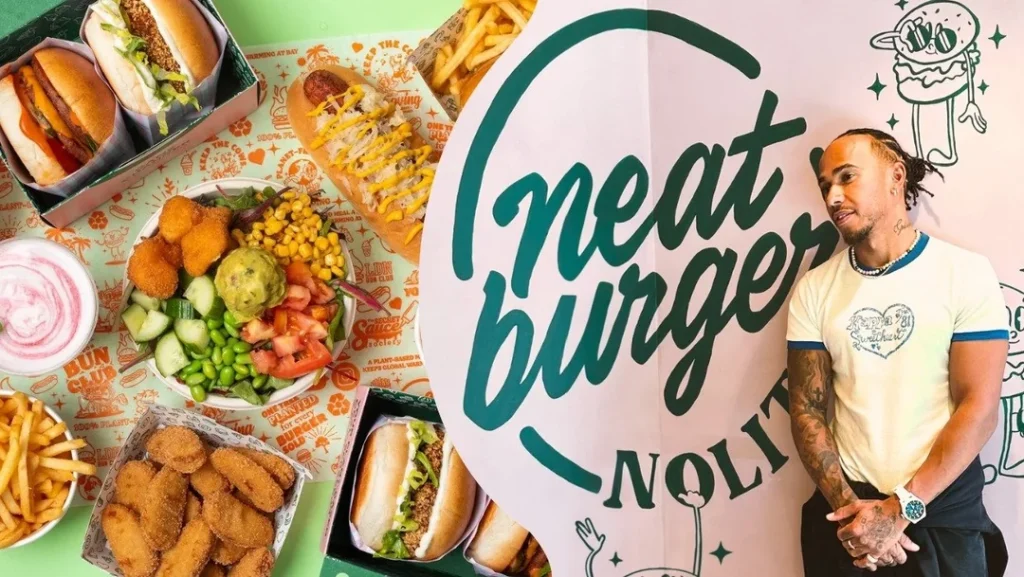
Lewis Hamilton is facing a rough patch on two fronts in 2025, one in business, the other in racing. His plant-based food venture, Neat Burger, has shuttered all of its UK locations amid mounting financial stress, while his on-track performance with Ferrari continues to draw scrutiny following another underwhelming race weekend in Jeddah.
Neat Burger’s UK Collapse: A Reality Check for Vegan Fast Food
Neat Burger launched with promise: a celebrity-backed chain promoting sustainable, plant-based meals with global ambitions. Backed by Leonardo DiCaprio and championed by Hamilton himself, it expanded rapidly across London and internationally, including locations in Milan and New York.
But behind the branding and buzz, cracks formed. Financial filings showed losses nearing £8 million in 2022, and by early 2025, the venture had become unsustainable in the UK. Economic factors like rising food costs, high urban rents, and a post-COVID shift to hybrid work contributed to dwindling footfall. By April, Neat Burger closed its final UK sites in Camden and Wembley, cutting approximately 150 jobs.
What this signals is less about a failure of the vegan concept and more about misjudged market timing and unsustainable scaling. While the food had its fans, pricing remained a sticking point, with meals often exceeding £14, Neat Burger struggled to capture a loyal fast-casual audience amid intense competition.
From an industry standpoint, this underscores the growing pressure on mid-tier dining brands, especially those built around niche health trends that require both ethical buy-in and economic trade-offs. Hamilton’s brand cachet wasn’t enough to offset structural headwinds, and the result is a cautionary tale for celebrity entrepreneurs entering F&B.
Jeddah Jolts: Hamilton’s Rocky Start at Ferrari
As the business setback unfolds, Hamilton’s return to the track hasn’t offered much relief. At the 2025 Saudi Arabian Grand Prix, he finished 7th, well behind teammate Charles Leclerc, who once again extracted more performance from the SF-25.
What’s becoming clear is a growing disconnect between Hamilton and his new machinery. His post-race comments were telling: he admitted there “wasn’t a second I felt comfortable in the car.” The Ferrari showed pace in Leclerc’s hands, but Hamilton struggled with understeer, inconsistent grip, and overall confidence in the chassis.
While some pundits speculate this is just part of the adaptation curve, the contrast with Leclerc’s pace suggests a deeper problem, not with the car’s potential, but with Hamilton’s current driving dynamics. His struggle appears less about raw performance and more about his interaction with Ferrari’s demanding setup, especially in low-downforce trim.
Internally, Ferrari leadership continues to back him. Team Principal Fred Vasseur has called the criticism premature, pointing to Hamilton’s history of comebacks. But from a performance analyst’s view, Hamilton’s adaptation curve may be steeper than expected, and the longer it takes, the more it could impact team strategy and cohesion.
A Broader View: When Pressure Multiplies
What ties both narratives, Neat Burger’s collapse and Ferrari’s growing pains, is a broader theme of expectation vs. execution. In both arenas, Hamilton entered 2025 with the weight of legacy and hype behind him. But results haven’t yet materialized, and in both cases, patience is wearing thin.
Yet if F1 has taught us anything, it’s that Hamilton is a long-game operator. His legacy is built not on avoiding setbacks but mastering the comeback. The Neat Burger closure may pave the way for leaner, more focused ventures abroad, and on the circuit, the season is still young.
There’s turbulence now, but the story of Lewis Hamilton in 2025 is still being written.
